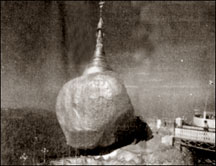|
A pilgrimage to Myanmar
By
Jinith de Silva
I had the fortune of visiting Myanmar, where Theravada
Buddhism is being truly followed and practised by its
people. According to chronicles, Buddhism was introduced
to Myanmar, then known as Swarna Bhumi, during the reign
of King Dharmashoka, the same period it was introduced
to Sri Lanka. Today more than 90 percent of the people
of Myanmar follow Theravada Buddhism and it is believed
that there are more than 22,000 Buddhist temples and
viharas in the country.
Some of the Pagodas (Dagab) of Myanmar are enormous
structures as big as the Dagabas found in ancient
Anuradhapura and Polonnaruwa. Though Myanmar, like many
other Asian nations fell pray to western dominance,
majority of its people are unspoilt by western
influences. They lead simple lives according to the
teachings of the Buddha. In this country the religion is
practised in its true form and temples and sculptures
are protected and well maintained. The strong link
between man and the religion is well demonstrated by the
fact that every man in his youth enters the Order
temporarily at least for two weeks. This is called
Shinpyu Ceremony. It is believed that there are, over
800,000 bhikhus in Myanmar. Below I will give few places
of Buddhist worship, I visited during my stay in
Myanmar.
Shevadagon Pagoda
|

Golden Rock Pagoda known as
�Kyaiktiyo� situated on the sheer edge of cliff.
|
Out of Buddhist places of worship this is the most
famous pagoda. It is believed that the Buddha�s hair
relic is enshrined in this pagoda. According to
chronicles, the Buddha handed over his hair relic to two
brothers Thapashu and Bhalluke. The name Sheva means
gold and dagon means three hills, the site of the pagoda
overlooking the city of Yangoon. This pagoda, which is
330 feet tall, is covered with 8688 gold plates. The
umbrella at the top is 33 feet high and embedded with
precious stones.
Shwethatyaung Buddha in Bogo was built in the 10th
century and is widely revered as the most beautiful
reclining Buddha in Myanmar. It is 180 feet long.
Shwezigon Pagoda in Bagan
Shwezigon derives its name from the word �Jayabhumi�,
ground of victory. Two great kings noted for their
patronage of the religion are associated with shwezigon.
Anawartha (1044-1077) and Kyansitta (1084-1113). A tooth
relic of the Buddha, gifted by Sri Lanka is enshrined
here. This pagoda has unique shape and many pagodas
built after this has followed its shape and style. There
are four small temples with 13 feet high standing Buddha
statues measuring around the pagoda.
Ananda Temple in Bagan
This Vihara has been built in memory of Ananda Thera,
the chief disciple of the Buddha. From distance, the
Vihara is visible in white and gold. This was built
around 1090 by king Kyansitta. There are four images
that represent the four Buddhas of the present world
cycle. On the north is Kakusanda, in the east Konagama
in the South Kassapa and in the west Gotama.
Law Kananda Pagoda
This pagoda stands on a site close to harbour of Bagan
on the bank of river Ayeyarwady. Law Kananda meaning
�Joy of the World� was built by king Anawartha to
enshrine a holy tooth replica.
The chronicles relate that the king of Sri Lanka sent
Anawartha a holy tooth relic and that when the ship from
Sri Lanka arrived in the harbour, Anawartha himself
descended neck deep into the water to bear on his head
the jewelled casket holding the holy tooth relic and
carried it to the palace.
The holy relic was enshrined in the Shwezigon. At that
instance when king Anawartha made a solemn vow and said.
�If I attain Buddhahood let another holy tooth proceed
from the first and miraculously another holy tooth
appeared. Again he made a vow and there was another
tooth and still another until there were four replicas.
He enshrined one of these holy tooth replicas in the Law
Kananda which he built near the place where first
replica of the holy tooth had first arrived and where he
had descended into the water to receive it.
Sulamani Temple
This temple was built by king Narapathisithu
(1174-1211). The name Sulamani in Pali means �Crowning
Jewel�.
The Sulamani consists of two storeys each of which is
square with porches on all four sides and the eastern
porch extending further than the others. All four sides
have a sealed image of the Buddha on a pedestal.
This is the most revered Buddha image in Myanmar. It
arrived in Mandalay from the Avakan in 1784. I noticed
several devotees applying gold leaves to the Buddha
image. As so many gold leaves have been applied, the
image has lost its original shape today.
Mirigun Pagoda
This 160 feet Mirigum Pagoda built in the late 18th
century is located on the banks of Ayeyarwady river
North of Mandalay. If this partly built pagoda was
completed it would have reached a height of more than
500 feet.
Golden Rock
A four hour drive from Yangoon brought us to the Golden
Rock at Kyaiklio. It is somewhat unbelievable to see
5.5-meter high pagoda resting atop a huge gilded boulder
precariously perched high on the edge of the hill.
Pin Day Caves
These limestone caves, which are around 200 million
years old, are another place of interest to visit. These
caves are situated about 1200 meters above sea level and
more than 8000 Buddha images are found in these caves.
During my visit, I realized what a close relationship
the kings of Myanmar had with their contemporaries of
Sri Lanka.
Courtesy Daily News May 17, 2006 |